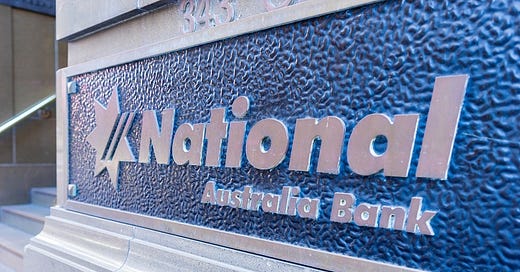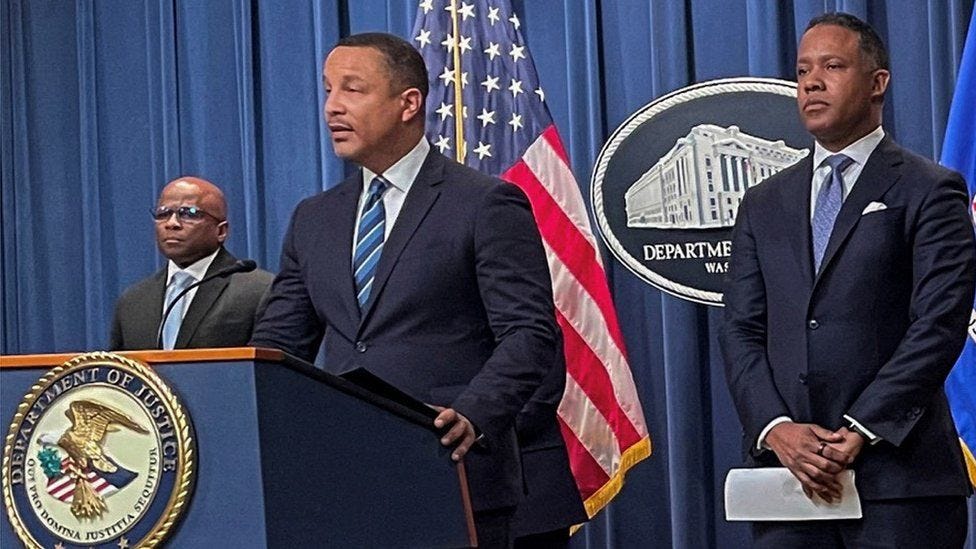
Australia's new AUDN stablecoin: the kangaroo that's hopping ahead in the CBDC race
Hello,
In today’s dispatch we have:
National Australia Bank is launching a stablecoin
Coinbase to halt Japan operations
US charges crypto exchange Bitzlato
National Australia Bank (NAB) is launching an Australian dollar-pegged stablecoin on the Ethereum network.
It's called AUDN and will be backed 1:1 by Australian Dollars (AUD) held in trust at NAB and launching on the Ethereum and Algorand blockchains.
Use cases:
Streamlining cross-border remittances - reducing the costs
Settle transactions on blockchain technology
Carbon credit trading
Repurchase agreements
Green deposits
Why is the Australian government going with Ethereum?
It is an open public blockchain (uncontrolled by any entity) which has been tried and true, standing the test of time and gaining widespread acceptance.
Using Ethereum would save the government the cost and effort of building a new payment infrastructure.
The "Public" blockchain is transparent and tamper-proof.
Offers a vast platform for developers to create payment-related apps on Ethereum using the Australian Stablecoin.
Cross-border transactions will become a breeze and frictionless for Stablecoin.
Australia has three coins in plan now:
AUDN
A$DC - Australia and New Zealand Banking Group (ANZ) X Fireblocks, pegged to the Australian dollar.
eAUD - Australia's own CBDC, started pilot test, expected to be completed by mid-2023.
Where does this put Australia with respect to other countries issuing Stablecoins?
Iran and Russia announced their plans to launch a new stablecoin backed by gold a few days ago, And the e-hryvnia, took its test run in Ukraine. Other countries such as India, the UAE, the USA, Malaysia, Singapore, and Thailand are also working on their own CBDCs. However, Australia is already well ahead in this regard.
Banks meeting crypto halfway is awesome, but there are some counterarguments we can't ignore:
Market participants have become sceptical about Stablecoins following the collapse of Terra's UST.
It is crucial to examine the underlying assets that support the Stablecoin as there is a risk of default if it is not constructed correctly.
There is a risk of regulatory ambiguity concerning Stablecoin's usage and acceptance by other financial institutions and government agencies, which may hinder its adoption and usage.
Anyways, the important part is that Stablecoin just got a stamp of approval from the bigwigs who call the shots on how the world runs - both in general and in finance. It's like the government is giving crypto a big ol' high-five!
Reactions from crypto Twitter:




Crypto exchange Coinbase to halt Japan operations
It looks like Coinbase is waving goodbye to the Land of the Rising Sun. The cryptocurrency exchange giant announced that it will shut down its operations in Japan. Coinbase's decision to cease operations comes after Kraken, another US-based exchange, announced that it would close operations in Japan by the end of this month.
Customers have until February 16 to withdraw their fiat and cryptocurrency holdings from Coinbase, the exchange stated on Wednesday. Starting from Friday, fiat deposits will be suspended on the platform.
However, Binance, the world's largest cryptocurrency trading platform, is attempting to return to the country after previously exiting the market in 2018.
With the crypto winter biting harder in late 2022 due to FTX's collapse, crypto businesses across the globe have begun recalibrating their business models to adapt to changing conditions.
Though this isn't the end for Coinbase in Asia, they will continue to operate in other countries in the region, like Singapore and South Korea.
US charges crypto exchange Bitzlato With Laundering $700M
Well, well, well, it looks like we have a new player in the crypto crime drama. The US government has charged crypto exchange Bitzlato with money laundering to a whopping $700 million. That's right, you read that correctly, $700 million!
It's like a plot twist straight out of a Hollywood movie, but unfortunately, this is all too real. Bitzlato is accused of facilitating illegal transactions and helping criminals and bad actors launder their ill-gotten gains through the exchange.
Bitzlato, according to the DOJ, allowed individuals to trade cryptocurrencies without authenticating their identities. Customers were told that "no selfies nor passports [are] required" by the Hong Kong-registered exchange. According to the government, the lack of KYC procedures has converted Bitzlato into a hub of illegal activities.
"Overnight, the Department worked with key partners here and abroad to disrupt Bitzlato, the China-based money laundering engine that fueled a high-tech axis of cryptocrime, and to arrest its founder, Russian national Anatoly Legkodymov," said Deputy Attorney General Lisa O. Monaco. "Today's actions send the clear message: Whether you break our laws from China or Europe — or abuse our financial system from a tropical island — you can expect to answer for your crimes inside a United States courtroom."
Wallets affiliated with Bitzlato hold slightly over $11,000, according to data from Arkham, a crypto intelligence service; at their peak, they totalled over $6 million, making Bitzlato a relatively modest role in the sector.
This is a reminder that the crypto world is not all sunshine and rainbows, and it's essential to be vigilant and protect yourself from fraud and illegal activities.















